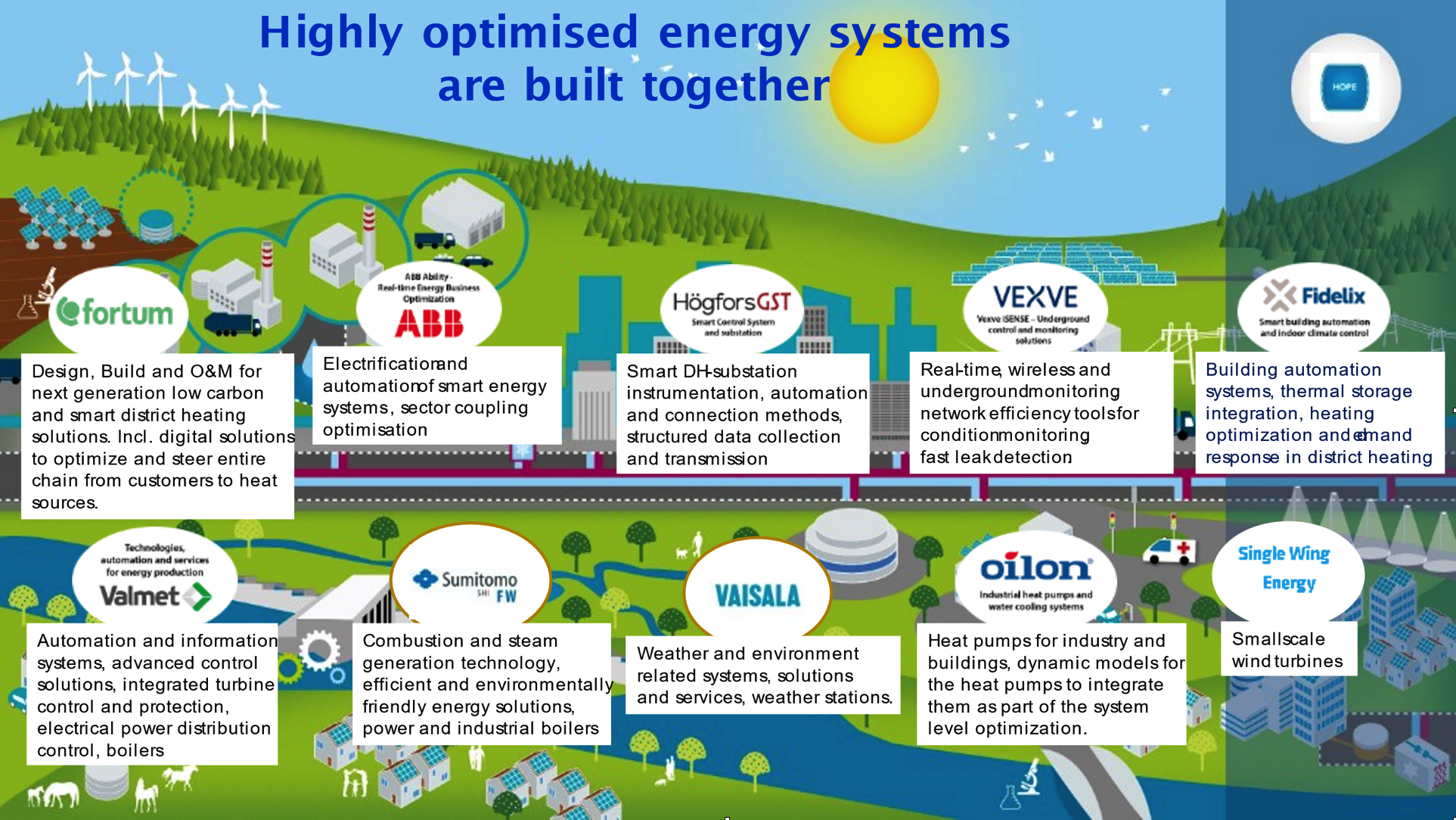Highly Efficient Energy Systems are developed together
Aim of the research is to develop tools and solutions for the multi-objective optimization of energy systems by considering the operating conditions and uncertainty. This enables optimization to be adapted to the prevailing conditions. Use of advanced weather forecasts aims to improve predictions on the state of energy devices and enable the inclusion of the uncertainty in the optimization. The integration of heat and electricity including production, distribution and demand aims to more efficient energy systems.
Cities as primary actors of climate efforts
The project is based on using the heating and cooling networks of Cities of Espoo and Oulu as development platforms in Finland. Cities of Espoo and Oulu are developing Smart district energy network with their primary energy supply partners. HOPE consortium’s research work helps to bring latest innovations into practical use.
System level optimization is used to include varying effects of the energy network and distributed weather conditions.
Consortium is aiming at collaborative solutions, where the power plant control is in place parallel to system level optimization. Pilot platforms within real-life power plant and network conditions are essential to demonstrate new solutions.
The project is based on using the heating and cooling networks of Cities of Espoo and Oulu as development platforms in Finland. Cities of Espoo and Oulu are developing Smart district energy network with their primary energy supply partners. HOPE consortium’s research work helps to bring latest innovations into practical use.
System level optimization is used to include varying effects of the energy network and distributed weather conditions.
Consortium is aiming at collaborative solutions, where the power plant control is in place parallel to system level optimization. Pilot platforms within real-life power plant and network conditions are essential to demonstrate new solutions.
Complexity and uncertainty are managed by forecasting, modelling, real-time monitoring and control
The management of increasingly complex energy systems is a challenge that requires new tools to perform it efficiently. In addition to increasing complexity, the uncertainty in the energy production and consumption increases due to increasing amount of intermittent renewable energy generation and more involvement in the demand side. The complexity and uncertainty need to be managed in order to meet the stricter environmental legislation on energy efficiency and carbon neutrality. Considering the ambitious environmental goals of European Union for 2030, fast actions are needed.
The project Highly Optimized Energy Systems (HOPE) is established to support the industry actors to develop solutions to increase energy efficiency within energy networks and advance cross-sectoral integration. Aim of the research is to develop tools and solutions for the multi-objective optimization of energy systems by taking into account the operating conditions and uncertainty. This enables optimization to be adapted to the prevailing conditions. Use of advanced weather forecasts aims to improve predictions on the state of energy devices and enable the inclusion of the uncertainty in the optimization. The integration of heat and electricity including production, distribution and demand aims to more efficient energy systems.
Benefit and competitive advantage of the solution
The project aims to solve problems by applying multi-objective optimization approach to the energy system with integration of heat and electricity. This provides new tools for the operational optimization of energy systems and takes into account the production, distribution and demand. Optimization solution will be modular and use advanced predictions on energy production and consumption. Integration of heat and electricity is expected to reveal new. synergies in the energy system. With this approach better management of energy systems can be achieved increasing the overall energy efficiency of the systems. Modular optimization solution facilitates the applicability of the approach to different systems. Furthermore, the project provides environment for new business models.

